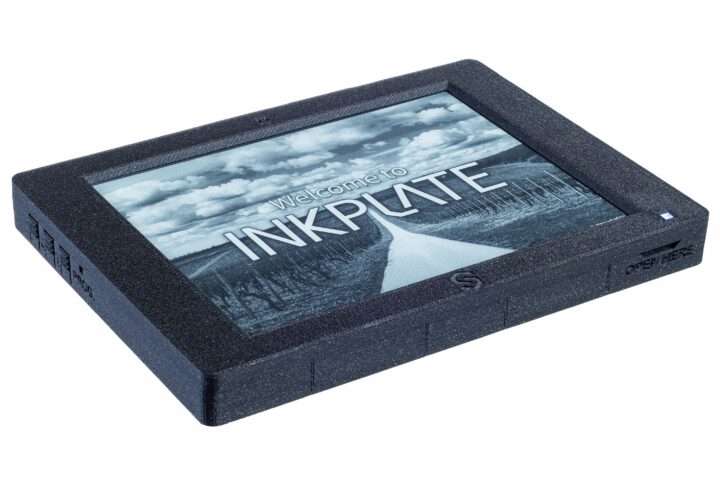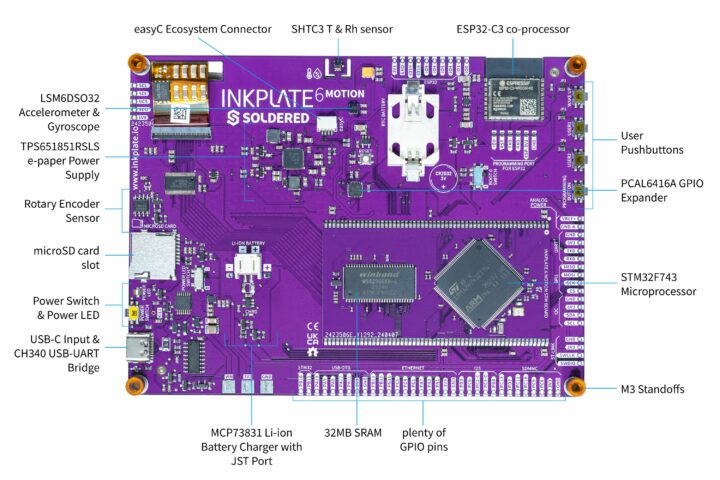The Inkplate 6 MOTION is a new product from Soldered Electronics in their Inkplate series of wireless e-paper displays. It is a 6-inch e-paper display with a partial refresh rate of 11fps which reduces obvious latency in rendering dynamic content such as videos, animations, and scrolling text.
The display is driven by an STMicroelectronics dual-core STM32H743 microcontroller, with an ESP32-C3 as a secondary processor. It features Wi-Fi and Bluetooth for networking and a host of peripheral interfaces for physical connectivity. It includes several sensors such as a rotary encoder for quick navigation, a gravitational accelerometer with a gyroscope for tracking device orientation, and a motion detection sensor.
We covered the original Inkplate 6 display when it launched on Crowd Supply in 2019. The Inkplate 6 is much less expensive than the new model but has a lower screen resolution (800 x 600 px) and slower refresh rates (256ms). Furthermore, it lacks the sensors on the Inkplate 6 MOTION.
The Inkplate 6 MOTION display is a 1024 x 768px screen with speedy refresh rates and is therefore ideal for dynamic e-paper projects such as information panels, a mounted frame for digital art, a minimalist typewriter, or an e-reader.
Inkplate 6 specifications:
- Microcontroller – STMicroelectronics STM32H743ZIT6
- Co-controller – ESP32-C3 WiFi and BLE SoC
- RAM – 2MB RAM, 32 MB external DRAM (W9825G6KH-6)
- Storage – 1MB flash memory, microSD card slot
- Screen
- Size – 6”
- Resolution – 1024 x 758 pixels
- Active Area – 90.6 x 122.4 mm
- Pixel Density – 212 ppi
- Modes – Black & white, or 4-bit greyscale
- Colors – Black, white, and 14 shades of grey
- Partial refresh – Supported for black & white and 4-bit greyscale modes
- Partial refresh time – 91 ms
- Full refresh time – 500ms (black & white), 800ms (greyscale)
- Connectivity
- Network – Wi-Fi and Bluetooth via ESP32-C3
- USB – USB-C (USB to UART via CH340C chip) for programming, power, and charging battery
- easy-C Ecosystem connector
- GPIO – 30+ pins for Ethernet, USB OTH, I²S, SDMMC, I²C, SPI, UART, and other protocols
- Power
- Input – 5 V (USB Type-C) or 3.7 V (Li-ion battery)
- Li-ion charger – Microchip MCP73831 linear charge management controller with LED indicator
- E-paper PMIC – Texas Instruments TPS651851RSL
- Current Draw – 22 μA
- Sensors
- STMicroelectronics LSM6DSO32 accelerometer and gyroscope module
- STHC3 temperature and humidity sensor
- Front-facing sensor – Broadcom APDS-9960 for proximity, gesture, and color detection
- Misc – 3x user buttons, 2x WS2812B LED, PCAL6416A GPIO expander
- Board Dimensions – 144 x 108 mm
- Enclosure Dimensions – 161 x 116 x 15 mm
The device is easy to program by plugging it into a computer with a USB-C cable, connecting it to a Wi-Fi or Bluetooth network, and uploading a few lines of code. The Inkplate 6 MOTION is compatible with popular, open-source development tools such as Arduino IDE, MicroPython, Adafruit GFX, Home Assistant, and ESPHome.
Similar to the older models in the Inkplate family, the Inkplate 6 MOTION e-paper display itself is open-source, hardware and software. The Inkplate 6 MOTION’s Arduino library, MicroPython library, and hardware files are hosted on GitHub. Documentation is accessible via a Read The Docs website for the Inkplate family.
The Inkplate 6 MOTION recently launched on Crowd Supply, with a $10,000 funding goal (surpassed at the time of writing). The display itself is priced at $169. You can get the display with an enclosure for $189 or with an enclosure and a pre-installed battery for $199. here is free shipping within the United States while a $12 shipping fee applies to the rest of the world. All orders are expected to ship by September 19, 2024.

Tomisin is a writer specializing in hardware product reviews, comparisons, and explainers. He is very passionate about small form factor and single-board computers.
Support CNX Software! Donate via cryptocurrencies, become a Patron on Patreon, or purchase goods on Amazon or Aliexpress







Who needs a high refresh rate on an e-paper display? It defeats its purpose and looks awful. But somehow it became a metric by which manufacturers compete.
> Who needs a high refresh rate on an e-paper display?
It’s nice for scrolling through epubs, browsing and typing. The Modos paper monitor presentation (also foss: https://gitlab.com/zephray/glider) gives a few examples: https://www.youtube.com/watch?v=pXn-bAwzNv4
> But somehow it became a metric by which manufacturers compete.
High-refresh rate EPDs last longer and leave less ghosting when driven slow and high bit rate for ebook reading as well so it’s a good indicators for quality.
Please approve my previous comment and delete this one. Thanks.